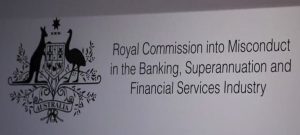
 THE revelations of the banking Royal Commission are just another example of what has gone wrong in so many countries since the false dawn of the fall of communism. The rise of unbridled predatory financial conduct and the rise of exploitative populism were not supposed to be the fruits of Ronald Reagan’s “Tear down this wall, Mr Gorbachev” speech. But that is the result.
THE revelations of the banking Royal Commission are just another example of what has gone wrong in so many countries since the false dawn of the fall of communism. The rise of unbridled predatory financial conduct and the rise of exploitative populism were not supposed to be the fruits of Ronald Reagan’s “Tear down this wall, Mr Gorbachev” speech. But that is the result.
Many are trying to explain what is happening and what might happen in the future.
Three recent publications help. Albright, Varoufakis and Frum*
Democracy and capitalism were supposed to be the victors after the end of communism. Instead, since the global financial crisis, democracy has gone backwards with core democratic values being undermined in ever more countries, including the US, after decades of progress.
Varoufakis may have a point about capitalism’s contradictions, but, surely the same human greed, nepotism and cronyism which undermines capitalism destroys communism.
Earlier, French economist Thomas Piketty pointed out that the inequality caused by the accumulation of capital would lead to its destruction.
All these writers point to some innate human qualities which make democracy and capitalism susceptible to destruction and that the expanding progress of democracy is not inevitable. They wonder about the solution.
In that, the evolution-determined trust in tribe has to be dealt with.
A fair amount of recent argument suggests that, of course, democracy does well when the economies of democracies do well. People in non-democratic countries yearn not so much for the freedom and democracy but for the prosperity that it apparently delivers. On the other hand, when non-democracies start delivering economically, particularly China, the value of democracy is questioned.
But there is something more determinant of democracy’s progress than economic performance. This is the rule of law, more importantly, the rule of good law.
The erosion of the rule of good law began with the 1980s deregulation and privatisation. There was a lot of merit in a lot of the deregulation and privatisation in the 1980s – getting rid of stagnant publicly owned monopolies and getting rid of unnecessary red tape. But it went too far, especially replacing independent regulation with self-regulation.
You can only trust some of the people some of the time.
In the US, Bill Clinton’s deregulation of the mortgage market to help poor people buy housing was exploited by financial institutions earning commissions on mortgages that would never be paid and bundling them into an unsuspecting bond market.
It collapsed when the underlying mortgagors defaulted. It ultimately led to the Global Financial Crisis.
Similarly, the failure to enact and enforce good immigration law led to a feeling in the US, Europe and Australia that jobs and culture were being overtaken.
Bad tax law and bad donations law led to a feeling of low and middle income people being ripped off by big corporations and high-income earners who did not pay their fair share.
It was exploitable. We now see the rise of democratic autocracies around the world where the leader always gets “elected” having ensured that the media is on side with opposition leaders and independent journalists arrested; and voting-entitlement requirements rigged.
Trump verges on a democratic autocrat.
But the source of the malaise is not the populists but the democrats who failed the population.
Capitalism did not fail the population. Rather the population was failed by the democrats who did not apply the rule of good law to regulate it.
There is nothing wrong with populism and politicians listening and acting upon the popular will.
It used to have the bad name of “poll-driven” which suggested that the ordinary people were invariably misguided and needed political leaders to lead the country away from their ill-informed views towards a better informed and enlightened path lit up by political leaders.
Well, that may have been true decades ago, but these days we can just say if only politicians would be more “poll-driven” and less donor-driven.
In Australia, the deregulation of the financial system and the privatisation of the Commonwealth Bank led to the excesses we have seen exposed by the Royal Commission.
A publicly owned Commonwealth Bank might have led by example to reduce the excesses of the other three.
But no. The results of deregulation in finance, immigration and labour have seen increasing exploitation and inequality. Is it any wonder that people have turned away from the established parties who delivered this?
The failure of democrats to deliver a fair and reasonable redistribution of society’s resources has invited the rise of a Trump or a Putin. The failure of elites in Australia to listen to concerns about unbridled immigration and its effect on resource allocation invite the rise of a Hanson.
In Australia, research by the Australian Population Research Institute this week expressed a similar failure. It said that the messages from pro-growth politicians combined with the fear by environmentally and economically responsible people being branded racist have inhibited debate on Australia’s unbridled population growth. This means that the business lobbyists who profit from it can claim to be virtuous while at the same time leaving the silenced majority to pay the costs.
That silenced majority invites an Australian Trump.
The message is clear.
Centrist Liberal and Labor politicians must reject their donors, embrace populism and enact the reasonable demands of the majority:
Slow immigration to it normal historic levels of 70,000 a year, not 190,000.
Reform the whole tax system so it is not a tax-avoidance system.
Regulate the financial system with some teeth. Self-regulation flies in the face of millennia of self-interested human evolution
Regulate the utilities sector so we are not milch cows.
Stand up to donors and the politically delivery equation – a trifling $26 million from the Business Council of Australia to deliver the Coalition message of $50 billion in tax cuts. Not a bad return on investment.
Regulate Big Sugar and Big Pharma so their products do not do so much harm to our people. And we know (contrary to Government Ministers) that people cannot apply “free choice”, as this week’s American Heart Foundation publication attests.
We now have at least Hungary, Cambodia, Poland, Russia, the Philippines, Kazakhstan and Turkey which we can described as democratic autocracies. The autocrat is “elected” with a majority with little or no vote-rigging on the day because the earlier trampling of democratic norms (especially free journalism) makes it unnecessary.
Let’s hope that does not happen in the US in 2020. But the indications are not good.
CRISPIN HULL
This article first appeared in The Canberra Times and other Fairfax Media on 5 May 2018.
* Bill Clinton’s Secretary of State Madeleine Albright, in “Fascism: a Warning”, fears fascism might return to some western democracies. Economics academic in Australia, the US and Greece and anti-austerity Greek Finance Minister during the Euro crisis in 2015, Yanis Varoufakis (in an introduction to a new edition of the Communist Manifesto) argues that Marx was right; just his timing was out. And George W. Bush’s speechwriter US-Canadian journalist David Frum’s latest book is called “Trumpocracy”.